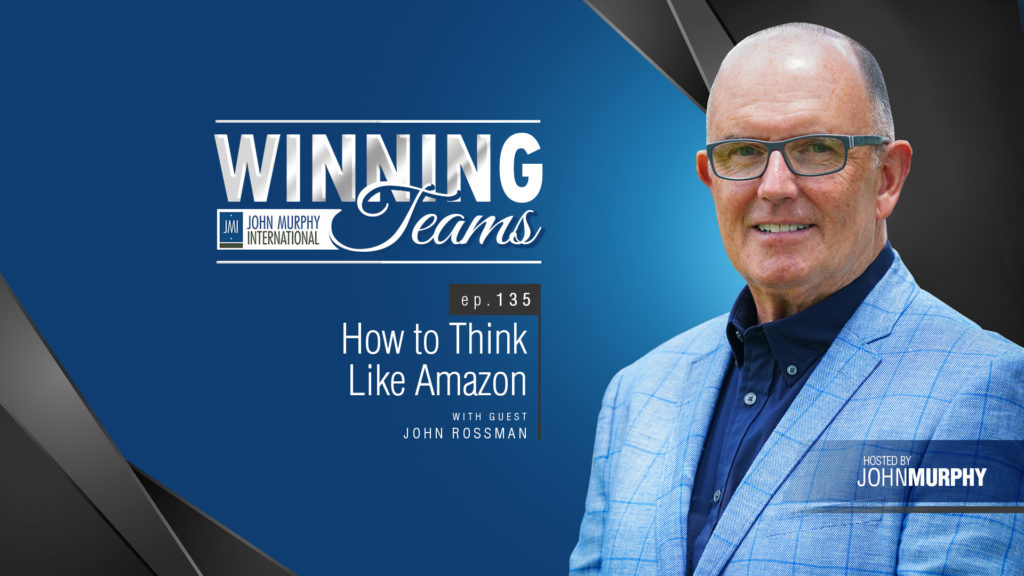Podcast: Play in new window | Download
Since its birth in 1994, Amazon has grown and found massive success. It has innovated, strategized, and won its way past the competition in the digital era, and the company’s success is one that countless business leaders would love to emulate. If you are one of those leaders, you’re in luck—-John Rossman returns to our show to talk about his newest book, Think Like Amazon: 50 1/2 Ideas to Become a Digital Leader.
As some of you might already know, John is the managing partner of Rossman Partners. He’s an expert in digital and e-commerce business. John launched and scaled the Amazon Marketplace business, which now accounts for 50% of Amazon’s business. In this episode, John talks about lessons from Amazon on how to become a digital leader. He goes into detail on a number of those ideas, giving us a neat preview of his book.
Make sure to read the highlights to see the ideas he discussed. Then, dive into the episode to get all the fine details of his thoughts.
Resetting Your Clocks (2:34)
- Innovation into digital requires patience, and businesses will have to “reset their clock.”
- Resetting the clock means looking beyond just three years for your business, and sticking with plans for five to eight years ahead instead.
- Amazon’s patience can be seen in the kind of business cases they approve: those that have a five- to eight-year time horizon.
- Going digital needs both speed and agility.
- Speed refers to operational excellence. Agility is the ability to sense and make changes happen.
- Data and intuition come hand in hand. Data helps in achieving operational excellence, while intuition directs the innovation.
Converting Employees Into Missionaries (7:07)
- Missionaries make better products because they care deeply about the products.
- Not everyone enters the business with the same passion as missionaries.
- Use the passionate people in the business to spread the passion.
- Use what motivates people to fit them into their role in the organization.
- Keep the mission on top of everyone’s minds.
- An example is Amazon’s customer obsession—every discussion or meeting starts with why the topic is vital for the customer.
Enterprise Remuneration (13:18)
- John starts by saying that he’s not necessarily advocating Amazon’s mode of compensation to everyone.
- Enterprise remuneration comes in the form of purely salary compensation with enterprise value compensation, which comes in stocks.
- Use compensation as a tool to enforce the idea that the organization is all about enterprise optimization.
- Some forms of compensation focus on short-term optimization of the organization’s components: team members, individuals, organizations, etc.
- Short-term optimization gets in the way of long-term enterprise optimization.
- Your organization’s compensation strategy should be in line with your company’s strategy—including timing.
Day One and Day Two Companies (16:08)
- A Day One company is set to create the future.
- A Day Two company only reacts to what the future could hold.
- Businesses who want to be innovative will have to learn how to become a Day One company.
- Companies have to realize that they are at risk when they are becoming stagnant.
Owning Dependencies (19:33)
- Getting along shouldn’t get in the way of achieving great results.
- Shaping the feature requires people to be willing to lean into topics and chew through them and hold each other accountable.
- One good way to hold each other accountable is to set Service Level Agreements, where everyone could be made to answer to their commitments.
John’s new book is available on Amazon, Kindle, and Barnes and Noble. You could reach him anytime through the Rossman Partners website and LinkedIn.
. . . . . . . . . . . . . . . . . . . . . . . . . . . . . . . . . . . . .
The Winning Teams Podcast is powered by the winning team at Valher Media.
Are you ready to be a great leader?
10 Key Traits of Top Business Leaders
These 10 Key Traits of Top Business Leaders can set you on your journey to lasting success! Click HERE to download. |
